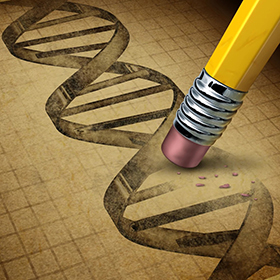
Genetic determinism—that is, the notion that “it’s all in the genes,” that everything is determined by our DNA and that we are victims of our hereditary—is just not right. You and your conditions, including weight gain and obesity, are not determined by your DNA. In studies of separated twins of obese parents, children growing up in a thin family are more likely to grow up thin. If they grow up in an overweight family they are more likely to be overweight. It appears that while genes have a role in weight gain, it is the passing on of eating habits that are more important.
In recent years, a new idea has come to the forefront of genetics and is the focus of thousands of studies: epigenetics. It is now understood that obesity and weight gain and all the chronic diseases are linked to epigenetic triggers. The vast majority of conditions leading to weight gain are a result of complex interactions between genes and the environment; these interactions cannot be explained by classic genetics.
It is true that the genes we are born with may have an association with weight gain and disease, but this does not prove causation. The truth is only a very small number of people have “smoking gun” genes which predispose them to obesity, diabetes and heart disease. Although heritability is considered to be a major risk factor for weight gain and obesity, the almost 40 candidate genes identified by gene studies (GWAS) so far account for only five percent to 10% of the observed variance in body mass index in human subjects. Other research suggests that heredity may be responsible for less than one percent of the obesity crisis. All the genes combined explain a maximum of 0.9% of variation in human body mass index. So, if it’s not in the genes…
Epigenetics provides the missing link between our environment and weight gain as well as all the chronic illnesses we suffer. Your genes are always responding, in good or bad ways, to what you eat, environmental toxins, your emotions, your stresses and your experiences, and to the nutritional microenvironment within each of your body’s cells. Environmental factors are capable of causing epigenetic changes in DNA that can potentially alter gene expression and result in weight gain and obesity or the opposite. Environmental influences—including nutrition, behaviour, chemicals, radiation and even stress and emotions—can silence or activate a gene without altering the genetic code in any way. These changes in gene expression, the so-called “turning on” of a gene, occur without any change to the DNA sequence.
Each nutrient, each interaction, each experience can therefore manifest itself through biochemical changes, which may have effects at birth or 40 years down the track, or even in the next generation or two. Some of the most well known studies linking epigenetics and obesity have involved the “Agouti” mice. A short-term dietary intervention in pregnant agouti mice, in the form of supplements of folic acid, vitamin B12, choline and betaine, has shown long lasting beneficial influences on the health and appearance of the offspring for multiple generations. The mice that did not get the nutritional supplementation became obese and developed the equivalent of metabolic syndrome and diabetes.
The GOOD news is that, while epigenetic changes can lead to an increase in weight gain and obesity, understanding epigenetics puts us in control. Not only can we avoid outcomes that were once thought of as “in our genes,” but also research is showing that, by changing our diet and lifestyle, we can reverse many of these conditions. Just as the genes for weight gain can be turned on, they can also—with the right information and actions—be turned off. Numerous studies have shown that changing our diet, lifestyle and environment alters our DNA. We are now in control.